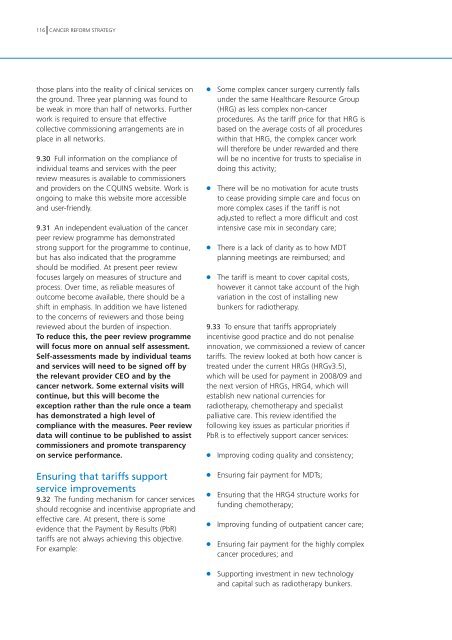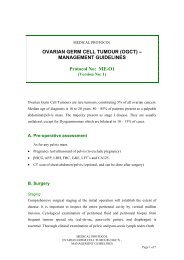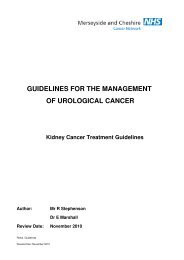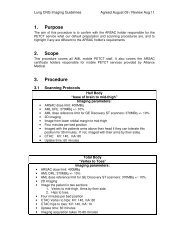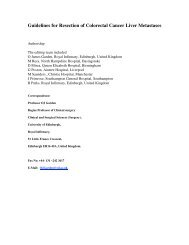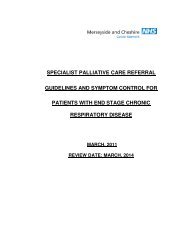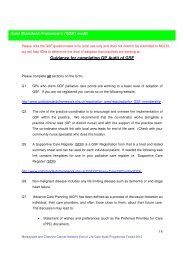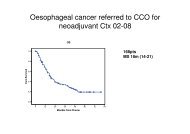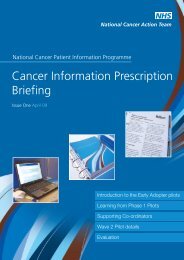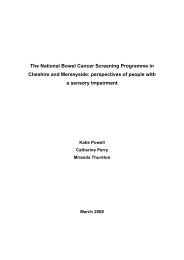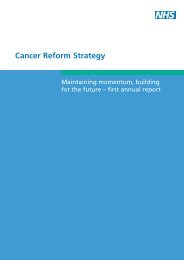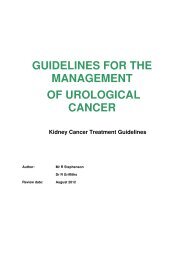Cancer Reform Strategy - NHS Cancer Screening Programmes
Cancer Reform Strategy - NHS Cancer Screening Programmes
Cancer Reform Strategy - NHS Cancer Screening Programmes
- No tags were found...
Create successful ePaper yourself
Turn your PDF publications into a flip-book with our unique Google optimized e-Paper software.
116 CANCER REFORM STRATEGYthose plans into the reality of clinical services onthe ground. Three year planning was found tobe weak in more than half of networks. Furtherwork is required to ensure that effectivecollective commissioning arrangements are inplace in all networks.9.30 Full information on the compliance ofindividual teams and services with the peerreview measures is available to commissionersand providers on the CQUINS website. Work isongoing to make this website more accessibleand user-friendly.9.31 An independent evaluation of the cancerpeer review programme has demonstratedstrong support for the programme to continue,but has also indicated that the programmeshould be modified. At present peer reviewfocuses largely on measures of structure andprocess. Over time, as reliable measures ofoutcome become available, there should be ashift in emphasis. In addition we have listenedto the concerns of reviewers and those beingreviewed about the burden of inspection.To reduce this, the peer review programmewill focus more on annual self assessment.Self-assessments made by individual teamsand services will need to be signed off bythe relevant provider CEO and by thecancer network. Some external visits willcontinue, but this will become theexception rather than the rule once a teamhas demonstrated a high level ofcompliance with the measures. Peer reviewdata will continue to be published to assistcommissioners and promote transparencyon service performance.●●●●Some complex cancer surgery currently fallsunder the same Healthcare Resource Group(HRG) as less complex non-cancerprocedures. As the tariff price for that HRG isbased on the average costs of all procedureswithin that HRG, the complex cancer workwill therefore be under rewarded and therewill be no incentive for trusts to specialise indoing this activity;There will be no motivation for acute truststo cease providing simple care and focus onmore complex cases if the tariff is notadjusted to reflect a more difficult and costintensive case mix in secondary care;There is a lack of clarity as to how MDTplanning meetings are reimbursed; andThe tariff is meant to cover capital costs,however it cannot take account of the highvariation in the cost of installing newbunkers for radiotherapy.9.33 To ensure that tariffs appropriatelyincentivise good practice and do not penaliseinnovation, we commissioned a review of cancertariffs. The review looked at both how cancer istreated under the current HRGs (HRGv3.5),which will be used for payment in 2008/09 andthe next version of HRGs, HRG4, which willestablish new national currencies forradiotherapy, chemotherapy and specialistpalliative care. This review identified thefollowing key issues as particular priorities ifPbR is to effectively support cancer services:●Improving coding quality and consistency;Ensuring that tariffs supportservice improvements9.32 The funding mechanism for cancer servicesshould recognise and incentivise appropriate andeffective care. At present, there is someevidence that the Payment by Results (PbR)tariffs are not always achieving this objective.For example:●●●●Ensuring fair payment for MDTs;Ensuring that the HRG4 structure works forfunding chemotherapy;Improving funding of outpatient cancer care;Ensuring fair payment for the highly complexcancer procedures; and●Supporting investment in new technologyand capital such as radiotherapy bunkers.


